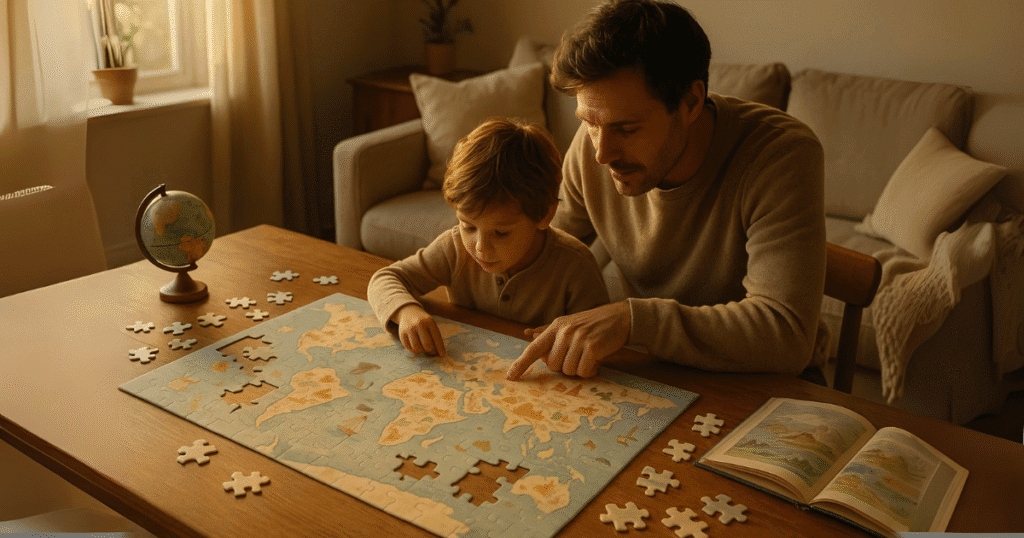The ‘What a Wonderful World’ puzzle has quickly gained popularity among families and educators alike. As one of the most captivating photographic jigsaw puzzles, it blends fun with cognitive engagement, making it a standout choice in the category of educational puzzles for families. This visually stunning and colorful puzzle offers more than just entertainment, it’s a dynamic tool for image-based learning that appeals to puzzlers of all ages.
Core Cognitive Skills Developed Through Jigsaw Puzzles
Problem-Solving with Jigsaw Puzzles
Jigsaw puzzles are fantastic for building essential cognitive abilities such as logical reasoning, perseverance, and strategic planning. When working on a puzzle like What a Wonderful World, puzzles actively engage in problem-solving with jigsaw puzzles, figuring out where each piece fits by analyzing shapes and visual clues. This process encourages critical thinking skills and nurtures patience, as solving complex sections requires focus and persistence.
Memory Enhancement Through Puzzles
Another key benefit is memory enhancement through puzzles. While assembling the pieces, puzzlers repeatedly recall image details, piece shapes, and colors, exercising short-term memory and improving overall memory recall. This memory work helps strengthen executive function, sharpening mental faculties that are useful both in and out of puzzle-solving contexts.
Together, these elements highlight why puzzles serve as excellent tools for developing problem-solving strategies and enhancing cognitive functions.
➡️ The ‘What a Wonderful World’ puzzle offers an ideal mix of challenge and engagement to support these core cognitive skills.
Skill Development in Children – A Look at the Science
Visual-Spatial Reasoning in Children
The intricate, panoramic design of the What a Wonderful World puzzle fosters visual-spatial reasoning in children by encouraging them to recognize patterns, shapes, and spatial relationships. Navigating the detailed landscape requires kids to develop depth perception and spatial processing skills, helping them mentally organize complex visual information. This is especially relevant when working with panoramic photography puzzles, where both detail and overall layout are crucial for success.
Fine Motor Skills Improvement
Manipulating hundreds of small pieces also promotes fine motor skills improvement. Handling the puzzle pieces builds hand-eye coordination, muscle control, and dexterity, abilities essential for writing, drawing, and other daily tasks. These physical skills complement cognitive growth, making puzzles a holistic learning tool for children.
By combining visual and motor skill development, puzzles like What a Wonderful World provide rich educational value grounded in science.
Why Puzzles Are Great for All Ages – From Kids to Adults
Puzzle-Based Learning for Kids
For young learners, puzzles offer an interactive way to absorb information about colors, geography, animals, and more, depending on the puzzle’s theme. This form of puzzle-based learning for kids integrates play with education, helping build foundational knowledge through hands-on exploration.
Interactive Learning Tools for Adults
Adults also benefit greatly from puzzles, which serve as effective interactive learning tools for adults by promoting mental agility and stress relief. Engaging in puzzles provides structured downtime and encourages screen-free learning activities, making them ideal for cognitive enrichment and brain training.
Together, puzzles foster lifelong learning across generations while providing enjoyable, educational screen-free alternatives.
Conclusion
The educational benefits of puzzles extend far beyond simple amusement. The What a Wonderful World puzzle is more than just a beautiful pastime; it’s an engaging educational puzzle for families that supports cognitive development, fine motor skills, and interactive learning for all ages.
Whether for children developing foundational skills or adults seeking mindful, screen-free entertainment, puzzles like this promote lifelong learning and brain training. For those interested in exploring more, consider diving into additional photographic jigsaw puzzles and scenic puzzle types to keep the learning, and fun, going strong.



